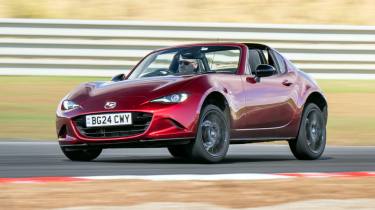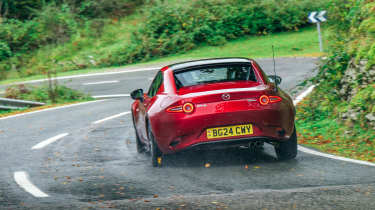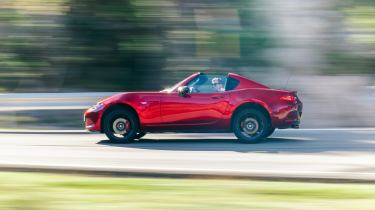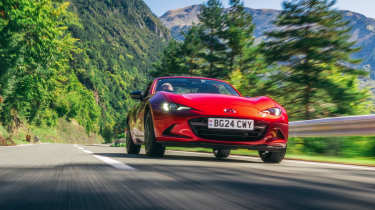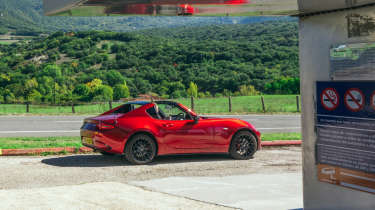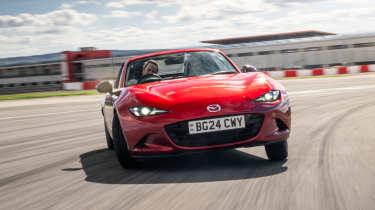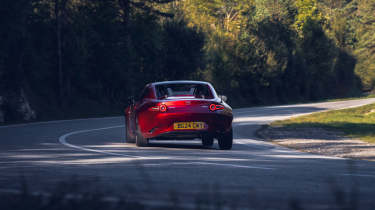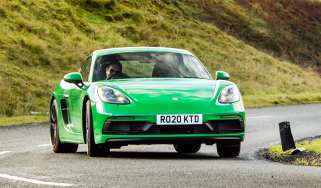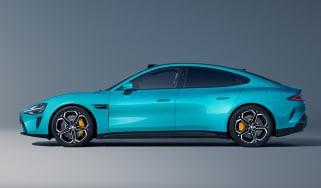Mazda MX-5 RF 2025 review – evo Car of the Year 2024’s people’s champion
The Mazda MX-5 RF is a real palate cleanser in an otherwise heavy, disconnected 2025 performance car marketplace
For some, the Mazda MX‑5, even the metal-roofed MX-5 RF, will seem old-fashioned in the opening moments of 2025. For others – particularly those who nod off when yet another new two-ton electric crossover with more horsepower than range graces their Facebook timeline – it serves the ultimate palate cleanser.
So just as on occasion it does well to lock one’s phone, leave it in another room, sit down and crack open a magazine, so too does a drive in the latest MX‑5 RF remind us of what we should be looking for in the very best driver’s cars.
To all but the keenest of eyes this 2025-model-year MX-5 may look like the same ND-generation car that’s been on sale since 2015, but to say nothing has changed would be to do the diligence and sensitivity of its makers a disservice. In the twilight years of its fourth generation, this latest update brings a number of desirable tricks and toys to bear, keeping the MX‑5 on the right side of contemporary.
The big story dynamically is the new asymmetric limited-slip differential that’s fitted to 2-litre models. This features a cam mechanism on the conical clutch that varies limiting force depending on whether the car is accelerating or decelerating.
More reviews
Group tests
In-depth reviews
Reviews
- Performance Link Mazda MX-5 R300 review – an MX-5 with Honda VTEC power
- BBR Supercharged Mazda MX-5 (ND) 2023 review – tuned 250bhp roadster driven
- BBR Supercharged Mazda MX-5 (NC) 2022 review – frenzied, affordable fun
- Mazda MX-5 R Sport 2020 review – floats like a butterfly, but stings like one too
- BBR Super 225 Mazda MX-5 review
- BBR Super 220 review - modded Mazda MX-5 hits with a light touch
In practice, this means the latest MX‑5 feels more stable both on and off power, with more bandwidth for adjustability. That’s especially appreciable in the inherently more structurally rigid MX-5 RF. Where in the past there was a hint of snippiness, with the car feeling like it might trip over itself on the limit, this updated model is more willing and feels less outside its comfort zone when the rear wheels start to over-rotate.
A new Track mode is designed to allow you to enjoy the new diff while retaining a safety net at the very extremes. It’s a nice addition, and a useful stepping stone to turning it all the way off once you’ve found your rhythm with the MX‑5 RF.
The Bilstein dampers that have been standard on 2-litre models for a while now are carried over, ensuring the new car feels on the right side of tied down for those sceptical of traditional roll-happy MX‑5 dynamics. It’s far from the last word in platform management but it’s controlled to the point of allowing decent pace and proper, satisfying flow.
It’s certainly not too firm, the car floating over uneven surfaces at all but the lowest speeds. It is a little pogo‑ey when pottering along properly beaten-up town-centre tarmac and the structure is far from the stiffest, even with the metal roof up, but it’s not unliveable.
Mazda claims the electric steering has been adjusted for reduced friction and increased clarity. The slightly too big (albeit perfect thickness) wheel is unchanged, and the feel is not a patch on what you get from a 1990 ‘NA’ MX‑5, but it’s an intuitive set-up – appropriately ratioed and weighted and certainly, more assured under duress when roof-up in the stiffer MX-5 RF.
Engine choices remain the same for the UK market, though for once we are the land of forbidden fruit, the 2-litre, 181bhp car being discontinued on the continent. If you want a more traditional MX‑5 experience – that’s to say more roll and less pace – the singing (but slow) 130bhp 1.5-litre is still available, which when fitted to the MX-5 RF, gets it to 62mph in 8.6sec, while the more potent 2-litre car that we tried, gets to 62mph in 6.8sec. The MX-5 RF is also 43kg heavier, although it’s still a bantamweight at just 1097kg.
The 2-litre engine remains free, willing and revvy even if it’s not the most charismatic, vocally gifted device. As ever, the slick-shifting six-speed manual transmission is an utter tonic, in a class of two with the Honda Civic Type R’s gearshift in the sub-£60,000 bracket.
Is there anything new visually? Up front we have those nice new claw-like LED DRLs, replacing the separate fiddly items that graced the ND up to this point. The rear lights have been modernised too, albeit with the same basic layout and physical shape. And that’s about it. A testament to what a forward-looking design this was when it first appeared a decade ago. As ever, the RF’s buttressed rump adds a bit of tongue-in-cheek exotic flare, even if it does look a little top-heavy when the roof is up.
> The 2025 Mazda MX-5 is all the sports car you need
Inside, USB-C charging joins the new 8.8-inch infotainment display, which has slick updated software with an intuitive UI. CarPlay and Android Auto are standard for smartphone integration. Thankfully, there remains a physical rotary controller, because the touch controls only work when stationary. The essential controls remain perfectly placed, clear and easy to use, with clicky, tactile physical hardware.
The process of putting the roof up and down is unchanged – the work of a button press instead of the manual labour a soft-top MX-5 requires. Buttresses rise, roof panels split and fold in and buttresses drop. In all the process takes 13 seconds at speeds of up to 6mph and is a nice bit of added visual theatre.
While the RF is more refined than the roadster, it’s far from revelatory. You’re just as hemmed-in when the roof is up, with just as much tyre roar but a bit less wind noise on the move. When down, it’s actually a bit more blustery than the soft-top car due to the aerodynamics of its quirky form. Worth it, we think, for the looks and added rigidity.
So in summary, we like what has changed, we love what hasn’t. The MX-5 RF in 2025 dispenses with none of the essential foundations the ND MX-5 first introduced a decade ago or indeed, the original introduced in 1989. And it’s never shone more brightly for it, than in a world seemingly hell-bent on sidelining the principles of simplicity, lightness and interactivity to which the Mazda so stubbornly clings.
And while there is a weight penalty in the MX-5 RF, it’s worth it for the cool buttressed looks and added sturdiness of a solid roof. It certainly didn’t hamper the MX-5 RF on evo Car of the Year 2024, where it put in a masterful shift of reminding our judges of what well-judged simplicity on a budget can achieve.
evo Car of the Year 2024 verdict, John Barker
All credit to Mazda for sticking to its lightweight principles with the MX‑5, which has stood firm while the rest of the new car market has swept by, addicted to ever greater performance and weight. But while it has stood firm, it hasn’t stood still, and the latest tweaks to the steering and limited-slip diff have elevated the MX‑5’s performance to a new and compelling level.
There was another lightweight, of course. The Morgan Plus Four also weighs close to 1000kg, but dynamically the Mazda is on another plane, as simple, chuckable and friendly as a Caterham Seven. The liberties you can take, the laugh-out-loud fun you can have are rooted in its terrific balance and light weight and enhanced by wonderful steering and a slick manual gearbox, and out of all proportion to the MX‑5’s power and price. Also, it all happens at modest speeds.
It was the outright winner for Henry Catchpole. ‘The lovely thing about the Mazda is that you never feel like you’re looking for the “right” road to enjoy it, and the most grin-inducing drives were on roads arguably more tailored to the bigger hitters. The balance is sublime and the handling is so encouraging, but what’s impressive is that it doesn’t feel like a shallow experience. The way it constantly asks you to think about weight transfer is right at the core of what makes an engaging drive. The big improvement is the steering, which now puts you as in touch with the road as the seat of your pants. And there are no modes to worry about. An induction kit and a sportier exhaust would be the only changes I’d want to make.’
I put it second overall and was in total agreement. The modest 205/45 tyres are nothing special, the engine has just 181bhp and is a charisma-free zone, and yet the MX‑5 was consistently one of the most rewarding and entertaining cars on the test. I found it utterly absorbing. And it felt exactly the same in the wet, which is the hallmark of a great chassis.
‘What a terrific car,’ said Dickie Meaden. ‘Just the reset we needed in terms of reminding us how wonderful a small, light, simple and modestly powerful rear-drive sports car can be. If eCoty was scored on the percentage of a car’s total performance used by any given driver at any given moment, the Mazda would have won by a country mile.’
For James Taylor, the Mazda was a surprise package of the test, the surprise being that it’s still brilliant after so many years despite so few changes. ‘It’s so incredibly friendly at the limit and the way it corners on its door handles is a big part of its charm.’ He also pointed out it was the only car on eCoty 2024 he could realistically afford to own but that he’d be very happy to own. The MX‑5 is the moral victor, the people’s champion.
Price and rivals
The elephant in the room with all MX-5s (all cars really) at the moment, is price, because it’s risen really quite a lot over recent years. An MX-5 in RF spec is always about £1900 more, give or take. But while a 2-litre RF was once available for under £25,000, the entry point ‘Prime Line’ with a 1.5-litre engine is now £29,915. The 2-litre engine is only optional from the middling Exclusive line, which so-equipped starts from £34,335.
The top-spec 2-litre Homura for a sturdy £37,035, is the one you need to get the BBS wheels, Recaro seats, limited-slip diff, front strut brace and Bilstein suspension – basically the raft of upgrades that made this car an evo Car of the Year podium-sitter.
Real rivals are in short supply. Where once the MX-5 had Toyota’s GT86 and latterly GR86 for company in the entry-level sports car sector, it’s now alone. It even once had a cousin in the Abarth 124 Spider, that’s now long-discontinued.
As always, the used market should factor into these things, which is where the excellent Toyotas come back in. The GR86 especially, is a real foil for the Mazda even in this excellent form, and values are finally starting to soften. More practical, more spacious, more refined and with a bit more poke, even now it’s off-sale, it’s the only worthy alternative.
